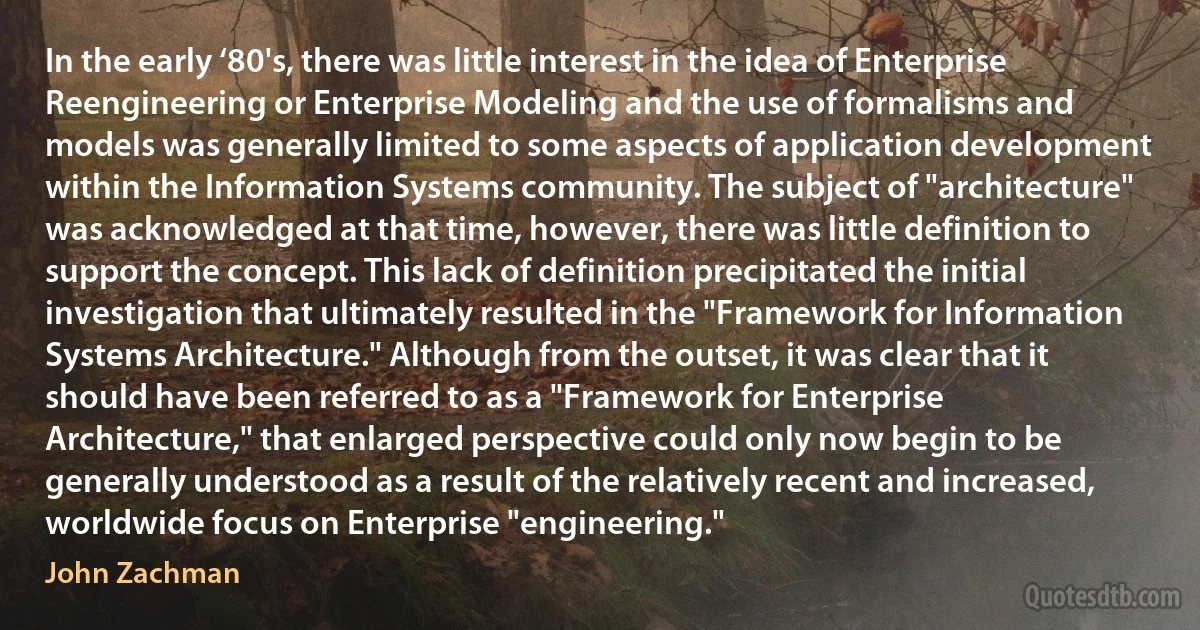
In the early ‘80's, there was little interest in the idea of Enterprise Reengineering or Enterprise Modeling and the use of formalisms and models was generally limited to some aspects of application development within the Information Systems community. The subject of "architecture" was acknowledged at that time, however, there was little definition to support the concept. This lack of definition precipitated the initial investigation that ultimately resulted in the "Framework for Information Systems Architecture." Although from the outset, it was clear that it should have been referred to as a "Framework for Enterprise Architecture," that enlarged perspective could only now begin to be generally understood as a result of the relatively recent and increased, worldwide focus on Enterprise "engineering."
John ZachmanRelated topics
architecture begin clear concept definition development early engineering idea initial interest lack limited modeling now outset result should support time use reengineeringRelated quotes
And yet, in our rush to respond to a very real and novel set of threats, the risk of government overreach -- the possibility that we lose some of our core liberties in pursuit of security -- also became more pronounced. [...] intelligence agencies cannot function without secrecy, which makes their work less subject to public debate. Yet there is an inevitable bias not only within the intelligence community, but among all of us who are responsible for national security, to collect more information about the world, not less. So in the absence of institutional requirements for regular debate -- and oversight that is public, as well as private or classified -- the danger of government overreach becomes more acute. And this is particularly true when surveillance technology and our reliance on digital information is evolving much faster than our laws.

Barack Obama
The economic betterment of a nation which is at a low level of intelligence and culture, or in which the population is small in relation to the extent and productivity of its territory, is best accomplished through free trade with highly cultivated, rich, and industrious nations. In the case of such a country every restriction of trade, intended to plant manufacturing industry within its borders, is premature and injurious, not only to the welfare of mankind in general, but to the progress of the nation itself. Only when the intellectual, political, and economic education of the nation has so far advanced as a result of free trade that its further progress would be checked and hindered by the import of foreign manufactures and the lack of a sufficient market for its own goods, can protective measures be justified.

Friedrich List
Clearly the present organization of the scientific community, cutting across the lines of nation states, bureaus, and almost all previously existing institutions, cannot be the result of conscious planning. There is, today, a good deal of organizational planning, but all of the instrumentalities which engage in this activity were founded after the development of science was well under way. Further, most of these organizations are parochial in nature, concerning themselves with only some special part of the scientific community like mathematical biophysics or Russian science. There is no general institution which has shaped or now can shape the development of science, only a mass of institutions which provide little more than liaison (and sometimes funds) for the scientific "producers.”.

Gordon Tullock
The good taste we speak of, which is that of literature, is not limited to what we call the sciences, but extends itself imperceptibly to other arts, such as architecture, painting, sculpture, and music. 'Tis the same discerning faculty which introduces universally the same elegance, the same symmetry, and the same order in the disposition of the parts; which inclines us to a noble simplicity, to natural beauties, and a judicious choice of ornaments. On the other hand, the depravation of taste in arts has been always a mark and consequence of the depravation of taste in literature. ... The good taste of literature reaches also to public customs, and the manner of living. An habit of consulting the best rules upon one subject, naturally leads to the doing it also upon others.

Charles Rollin
In recent years, demagogy, violence, cruelty, and vileness have seized a great country embarked on the path of socialist development. I refer, of course, to China. It is impossible without horror and pain to read about the mass contagion of anti-humanism being spread by "the great helmsman" and his accomplices, about the Red Guards who, according to the Chinese radio, "jumped with joy" during public executions of "ideological enemies" of Chairman Mao.
The idiocy of the cult of personality has assumed in China monstrous, grotesquely tragicomic forms, carrying to the point of absurdity many of the traits of Stalinism and Hitlerism. But this absurdity has proved effective in making fools of tens of millions of people and in destroying and humiliating millions of intelligent citizens.

Andrei Sakharov
